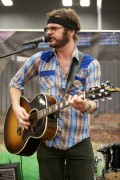Speaking at AWME on Saturday, Brian Ritchie shared his transition from the Violent Femmes, to the shakuhachi to MONA FOMA, while questioning the idea of world music as a genre and explaining why silence is sometimes good for us.
“If you follow the music instead of the money, you’ll never be bored. If you’re good, you’ll still make money.”
Brian Ritchie, former bass guitarist for the Violent Femmes, is no greater example of his own advice, which he shared when he spoke to a joint audience as part of the Australasian Worldwide Music Expo (AWME) and Face The Music in Melbourne on Saturday.
Since his days touring with the Violent Femmes, best remembered for their smash hit, ‘Blister In The Sun’, Brian has trained to the highest level in the shakuhaci, a Japanese end-blown flute, and has been the curator of the contemporary music festival, MONA FOMA, for the last 4 years. His passion for what he does is evident when he speaks and clearly Brian is all about the journey, the music and the experience.
Even when his shakuhachi teacher asked him why a rockstar would want to learn such a delicate, traditional Japanese instrument. Ritchie replied with a smirk, “If you don’t know, maybe it is you who shouldn’t be playing.”
Indeed, when he spoke of an experience he had, playing meditative pieces, prescribed by Japanese tradition, on the shakuhachi at a ceremony for an infant who had died, he said he was so grateful to have known the traditional pieces, because, at that time, “nothing else would have sufficed.”
Yet the world is changing and Ritchie is part of that, being an American-Australian who both learnt and can now teach this ancient Japanese flute.
“This is the way the world is and it forces us to re-examine the concepts of authenticity and tradition.”
Taking it a step further, he addressed a question that was brought up several times during the AWME conference – whether or not the notion of a world music genre in this day and age of globalisation was now obsolete.
“It’s not obsolete,” replied Brian. “It was never valid.”
He spoke of how so much of western music has been cherry picked from the music of so many different cultures around the world, that we have been experiencing world music, by definition, from the beginning.
In western culture, we do not hold our teachers in such high regard as they do in many Asian cultures, such as in Japan. It is there that Brian achieved the highest level of playing on the shakuhachi, where he is now not only considered fit to teach, but, as one who now bears that title, that he must. He referenced the rather derogatory statement, “he who can, does; he who cannot, teaches,” as an example of where perhaps our own music culture has lost its way.
The issue of noise pollution was also raised and Brian spoke about the potential damage we are doing to our hearing by allowing ourselves to be frequently blasted with music of all sorts at loud volume, be it from buskers along the street or from heavy “doof doof” music blaring in cars.
He pointed out how so many people these days talk about vegan and organic food and so forth, but that they never give consideration to what they’re doing to their ears. When it comes to the incessant background music in our lives, Ritchie’s response is simple.
“We’d be better off with silence.”
He urged musicians to think about balance in their music. To practice with an acoustic instrument sometimes if they don’t normally and to play in different venues at at different types of events.
Brian and his wife moved to Tasmania in 2008 and soon after he took on the role of festival organiser for a new music festival that was starting in conjunction with MONA, the Museum of Old and New Art, in Hobart.
MONA FOMA, affectionately known as MOFO (much to the amusement of anyone familiar with other uses of the term), started off in a confusing and eccentric manner and, in many respects, has continued that way ever since.
Using social media to attract over 100 people to a protest without ever offering a cause, the team managed to create a protest against the very festival they were launching, complete with marching band and giant signs, creating plenty of media attention amidst the inevitable chaos.
These days, the confusion might simply come from Brian deliberately putting a performer in a venue that’s wrong for them, just to unsettle them or their audience.
He’s not a fan of creating themes or even explaining the extraordinary musical installations that are created each year for the festival, including one focused entirely on the music of Frank Zappa, which spanned four floors, and an upcoming piece which involves underwater drumming in the Derwent River.
“As soon as you [explain things], you erode their ability to experience it with beginner’s mind,” he says. “I prefer that people experience art.”
Brian Ritchie still has more he wants to do with the festival, and more international acts he wants to woo, including Tom Waits, Kate Bush and Patti Smith. But he has managed to bring out PJ Harvey, as well as David Byrne from Talking Heads, who were both originally on his wishlist.
Amanda Palmer has inadvertantly become somewhat of a staple at MOFO, simply because she loves playing there and they love having her. One year, she even ended up playing the whole first Violent Femmes album, with Brian on bass, of course, after Death Grips dropped out at the last minute.
With a total of two hours rehearsal, they took to the stage in the suddenly-vacant timeslot and ended up being the biggest act of the festival, but not before ticket sales quickly sky-rocketed with news of the almost impromptu performance.
Ritchie, not surprisingly, is keen to see other musicians to get out of their comfort zones, just as he and Amanda are clearly happy to do, and to start having more fun with their music. He summed it up in one of his last pieces of advice to the conference.
“We call it ‘playing’ for a reason.”
MONA FOMA runs from 16-20 January 2013 in Hobart, Tasmania.




















